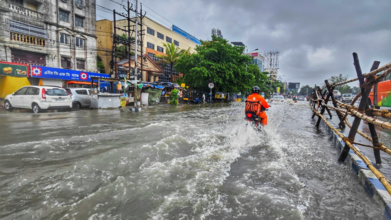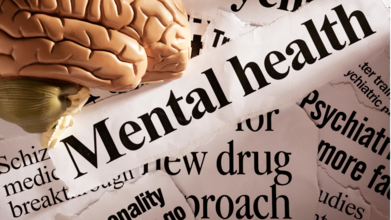- Health Conditions A-Z
- Health & Wellness
- Nutrition
- Fitness
- Health News
- Ayurveda
- Videos
- Medicine A-Z
- Parenting
- Web Stories
Are Therapists Responsible For The Rise In Family Estrangement?

Family Estrangement (Credit-Canva)
In recent times, therapists have been unfairly painted as villains in the narrative of family estrangement. Some critics have accused therapists of encouraging or even causing family cutoffs. However, this is a misrepresentation of the therapeutic process and the complex reasons behind family estrangement.
While therapy can play a role in facilitating family estrangement, it's important to recognize that the decision to cut ties is often a complex one, rooted in deep-seated trauma and dysfunction. Therapists are not the cause of family estrangement, but rather a source of support and guidance for individuals seeking to heal and build healthier relationships.
What Does Therapy Actually Entail?
Therapists are trained to help individuals build healthier relationships, not to break them apart. The goal of therapy is to empower individuals to make informed decisions about their lives. When family members engage in therapy with a genuine desire for healing and growth, it can strengthen family bonds.
Many people believe therapy is not necessary as you can just speak to your family about it or your friends and it will be fine. But that is not the case. A therapist will help you understand what you were feeling and why it affected you. They will also help you identify your triggers and how to manage them.
Why People Choose Estrangement?
It's important to understand that family estrangement is often a last resort, not a first choice. People who choose to distance themselves from family members typically do so after years of emotional or physical abuse, neglect, or other forms of harmful behaviour. Therapy can provide a safe space for individuals to process these experiences and make informed decisions about their relationships.
Stigma of Estrangement
Unfortunately, family estrangement is still stigmatized. Many people feel ashamed or guilty about cutting ties with family members, even when it's necessary for their well-being. Social media has stories filled with people sharing their experiences that led them to become estranged from their families. Therapists can help destigmatize estrangement and provide support to those who are navigating this difficult decision.
Role of Therapy in Empowered Choices
Therapy can be an important tool for people who have gone through difficulties and hardships which affect their mental health. There are many ways it helps people regain their peace and find the perfect solution for their issues. Therapy empowers individuals to,
Gain Self-Awareness
The first step to healing is acknowledging their own pain, wrongdoings and hurt. By exploring their past experiences and family dynamics, individuals can gain a deeper understanding of their own needs and boundaries.
Develop Healthy Boundaries
Therapy can help individuals set and maintain healthy boundaries with family members, protecting their emotional well-being. Many people have difficulty standing up for themselves and stopping people from taking advantage of them. Therapy helps them in this regard.
Build Self-Esteem
Self-esteem can be a difficult thing to build when you are surrounded by people who will bring you down no matter what. Therapists can help individuals develop a strong sense of self-worth and recognize their value, empowering them to make choices that prioritize their mental health.
Process Trauma
When someone goes through something difficult, it can change the way they think, behave and even make decisions, which is due to trauma. Therapy provides a safe space to process traumatic experiences, such as abuse or neglect, and develop coping mechanisms.
Are Heatstroke And Heat-Illnesses Still Problems In Monsoon? The Answer Is Yes, Here's How

(Credit-Canva)
As soon as we heat peak summer heat in India, the only thig most people look forward to are the monsoon rains. Even with untimely mid-summer rains, people breathe a sigh of relief, even if it is momentary. With the transition of summer to monsoon, people find themselves feeling relieved that their risk of heat-related issues are lesser. However, it is still a looming issue, nonetheless.
A 2024 study published in the Advancing Earth and Space Sciences, points out the increasing danger of moist heat in India, especially during monsoon breaks. It finds that the periods of dry weather during monsoon season are becoming more frequent and is exposing hundreds of millions of people to life-threatening conditions.
The report points to global warming and specific weather patterns as the main causes, which in turn are projected to have serious consequences for public health and the economy.
What is Moist Heat and Why is it a Problem?
Moist heat is a combination of high temperature and high humidity. It's especially dangerous because the high humidity prevents sweat from evaporating, which is how our bodies cool down.
The report uses the Wet-Bulb Globe Temperature (WBGT) to measure this risk. A WBGT of over 31°C is considered hazardous for physical work. This is a critical point where people working outside can suffer from heat exhaustion, heatstroke, and other life-threatening conditions.
How is Heat In Monsoon An Issue
The study's most significant finding is that monsoon breaks, which are short periods without rain during the monsoon season, are surprisingly dangerous. While we often think of the monsoon as a time of cooling rain, these breaks create conditions of extreme moist heat. The report shows that monsoon breaks are a far greater threat than the hot summer months.
Widespread Danger:Between 1951 and 2020, monsoon breaks led to an increase in the area of India exposed to dangerous WBGT levels. This affected at least 670 million people.
Greater Risk Than Other Seasons: The risk of extreme moist heat during monsoon breaks is substantially higher than during other times of the year.
What Is The Reason Behind Heat In Monsoon?
The research points to two main factors behind the rise in extreme moist heat during monsoon breaks:
Global Warming
The study found a strong link between rising global temperatures and the increase in moist heat extremes in India. This suggests that global warming is making these events more frequent and intense.
Monsoon Weather Patterns
Specific weather patterns during monsoon breaks, like periods of prolonged warming and changes in air circulation, are also driving up moist heat levels. The presence of high humidity and heat during these dry spells creates a perfect storm for dangerous conditions.
How Does Heat In Monsoon Affect People?
This research has major implications for public health and policy in India, a country where a large portion of the population works in agriculture and construction.
Reduced Work Performance
The study projects that work performance in India could decline by 30-40% by the end of the century due to rising moist heat.
Economic Consequences
This drop in productivity could lead to a significant economic loss, potentially reducing India's GDP by as much as 4% and causing crop prices to rise.
Need for Policy Change
The findings emphasize the urgent need for a review of outdoor working hours and the development of new public health policies to protect workers from the growing threat of extreme moist heat.
Can Obesity Cause Cancer? Study Finds A Link Between This Common Cause Of Obesity In Our Diet And Increased Risk Of Cancer

(Credit-Canva)
The fight against weight gain and fat loss is something many people are fighting globally. Understanding that losing weight is more than simply being a smaller size is still foreign to many people, causing them to adopt unhealthy habits. When you lose weight, one needs to make sure they are eating appropriate foods because what you eat could have a huge impact on your health, sometimes even more than the weight itself.
Obesity is known to increase the risk of many cancers and weaken our body's ability to fight tumors. In a 2019 study obesity was linked to 4.8% of new cancers in men and 10.6% in women.
But a new study shows that not all fats are the same when it comes to this risk. The type of fat we eat can have a big impact on how tumors grow, even if a person is the same weight.
How Do Different Kinds Of Fat Affect Tumor Growth?
Researchers wanted to understand if all fats are the same when it comes to cancer risk in people with obesity. They fed mice different high-fat diets and found some surprising results.
Diets made with animal fats like lard, beef tallow, and butter made tumors grow much faster. However, diets made with plant oils like coconut, palm, and olive oil did not cause this accelerated tumor growth. What's most important is that all the mice were equally obese. This shows that the type of fat, not just being obese, is what made the difference in how the tumors grew.
How Did These Fats Affect Our Immune System?
The researchers discovered that the type of fat in the diet affects the body's immune system, specifically two types of cells: natural killer (NK) cells and CD8 T cells. These are the "killer" cells of our immune system, responsible for fighting off cancer.
- In mice fed the butter-based diet, these immune cells were less active and fewer in number inside the tumors.
- In mice fed the palm oil-based diet, these immune cells were more active and better at fighting the tumors.
This difference seems to be related to a specific fat-related molecule. The butter-based diet led to a buildup of a fatty substance called long-chain acylcarnitine in the blood. This substance acted as an "immunosuppressive metabolite"—it actively suppressed the function of the CD8 T cells, making them less effective at killing cancer cells.
Can Obesity Cause Cancer?
According to the National Cancer Institute, a strong connection between excess body weight and at least 13 types of cancer has been found. The risk is highest for endometrial and esophageal cancers. For these, a person with severe obesity can have a risk that is 5 to 7 times higher than someone at a healthy weight. For other cancers, the risk for people with obesity can range from a 10% increase to double the risk.
Why Does Excess Weight Increase Cancer Risk?
Scientists have several ideas about how obesity and overweight can lead to cancer:
Extra Estrogen
Fat tissue produces more estrogen. High levels of this hormone can increase the risk of cancers like breast, endometrial, and ovarian cancer.
Insulin and IGF-1
People with obesity often have higher levels of insulin and a hormone called IGF-1 in their blood. High levels of both can encourage cancer growth, especially for colorectal, thyroid, breast, and other cancers.
Chronic Inflammation
Excess body fat can cause ongoing, low-level inflammation in the body. This inflammation can directly help tumors grow.
Hormones from Fat Cells
Fat cells release hormones called adipokines. Some of these, like leptin, can promote cell growth, while others, like adiponectin, which helps protect against cancer, are less common in people with obesity.
Does Losing Weight Lower Cancer Risk?
While more research is needed, some studies suggest that losing weight can reduce the risk of certain cancers. In one large study of postmenopausal women, those who lost more than 5% of their body weight had a lower risk of obesity-related cancers, especially endometrial cancer.
Weight loss surgery (bariatric surgery) has also been shown to reduce the risk of cancer overall, especially in women. Some newer weight-loss medications have also been linked to a reduced risk of certain cancers.
7 Warning Signs Your Mental Health Is Declining and How to Respond

Mental health challenges often develop gradually, not suddenly. Small changes in your energy, mood, or habits can be early warning signs that something is wrong. Recognising these signals early can help you take steps to protect your wellbeing.
1. You’re Tired Even After a “Good Night’s Sleep”
Eight hours in bed and yet you still feel like a zombie? This isn’t just about physical tiredness; it’s the emotional kind that makes everything feel heavier. To fight back, try delaying that first coffee, getting your heart pumping for a few minutes, eating balanced meals, improving your sleep hygiene, or giving cold showers a go for an instant jolt.
2. Your Inner Hermit Has Taken Over
You stop replying to texts. Plans mysteriously “don’t work out”. Suddenly, the idea of spending time with people feels like running a marathon in flip-flops. While hiding away can feel safe, it also convinces your brain you’re completely alone. Ease back in slowly: visit a cafe, a library, or a park, even if you just sit there without talking to anyone. Gentle exposure can remind your mind that the world isn’t hostile.
3. Everything and Everyone Gets On Your Nerves
Slow walkers. People chewing loudly. Someone breathing in your general direction. When tiny annoyances feel like personal attacks, it’s usually a sign your tolerance levels are shrinking. The fix? Slow down your reactions. Don’t let one irritating moment snowball into a bad day. A little pause between frustration and action can save you a lot of energy.
4. The Future Looks Like a Grey, Endless Road
When your brain starts expecting the worst, it’s a major red flag. Break the cycle by giving yourself something to look forward to, no matter how small. Book tickets for a film, plan a walk in your favourite spot, or schedule dinner with a friend. Hope often hides in the little things.
5. Your Appetite Is Playing Tricks on You
You might be inhaling biscuits like they’re air or forgetting to eat altogether because nothing feels worth the effort. Either way, it’s a disruption in basic self-care. Start by checking in with your eating patterns and, if possible, plan meals ahead. A food log can help spot changes you didn’t even realise were happening. If your appetite swings keep going, see a doctor. It could be more than stress.
6. Sleep Has Packed Its Bags and Left
Whether you’re tossing for hours, waking up in the middle of the night, or opening your eyes in the morning feeling like you’ve been hit by a bus, poor sleep is often one of the first signs your mental health is slipping. Build a solid bedtime routine, experiment with cognitive shuffling (mentally hopping between unrelated words), relax your jaw before bed, or play calming sounds to help your nervous system wind down.
7. Your Personal Care Routine Has Gone Missing
Showers? Optional. Laundry? Forget it. Brushing teeth? Tomorrow, maybe. This isn’t laziness; it’s your body’s way of signalling that your energy reserves are running low. Make the basics easier for yourself: keep floss picks on the counter, place shampoo where you can’t miss it, or keep fresh clothes within reach. Reducing the steps can make the difference between “I can’t” and “I did”.
© 2024 Bennett, Coleman & Company Limited

